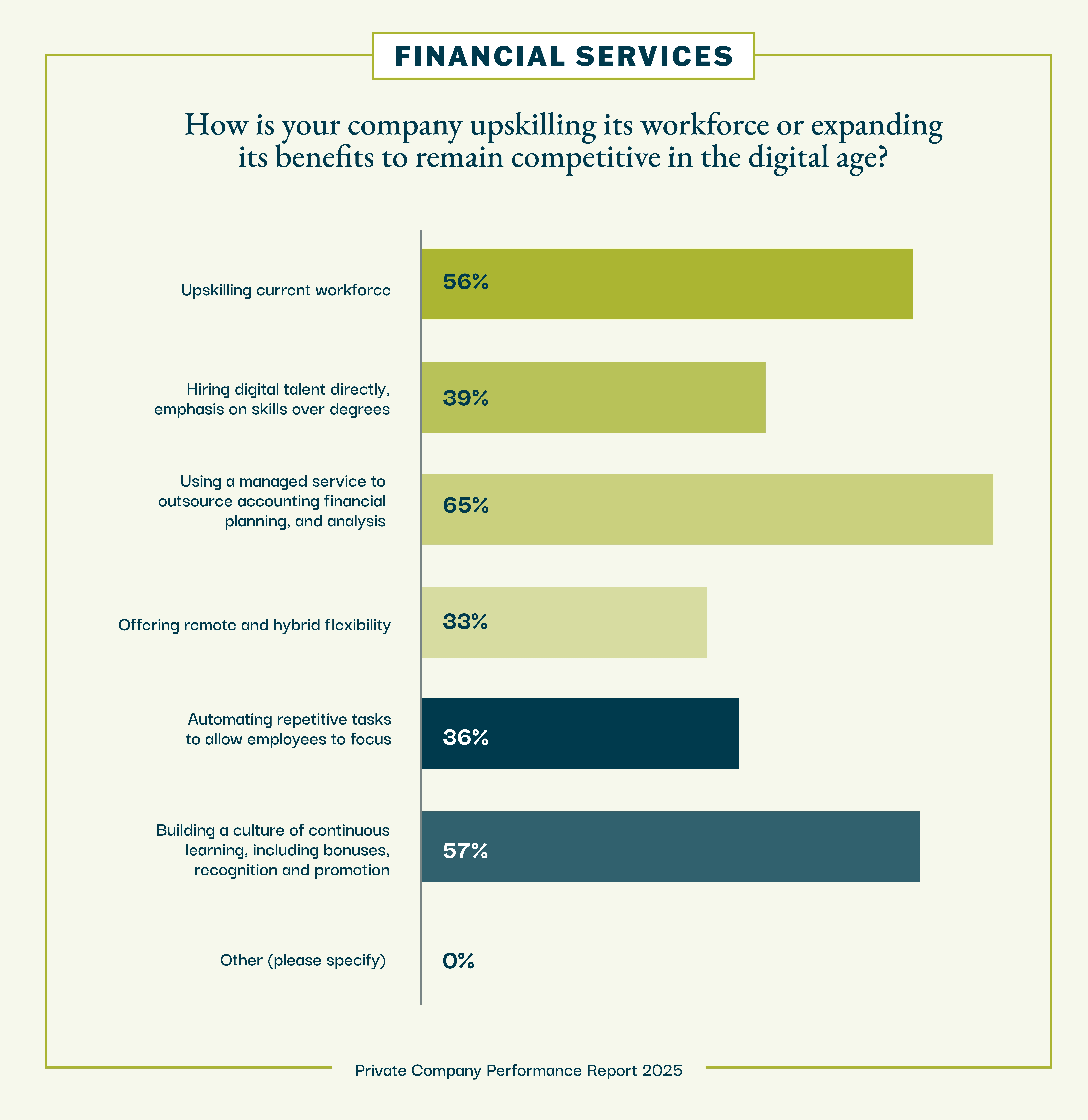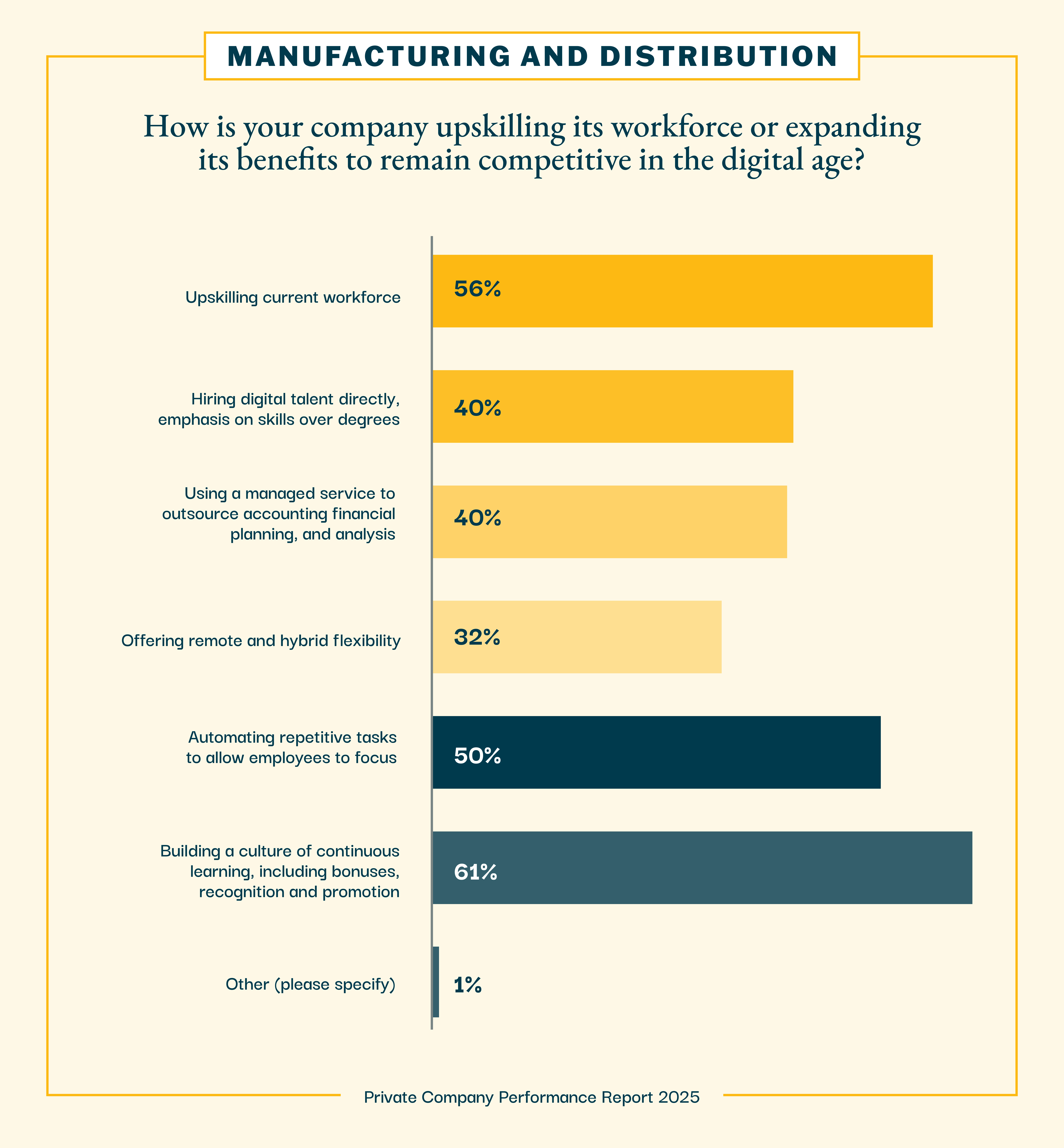May 13, 2025 - There are many ways to prepare for the future, but one of the best is investing in employees. In our annual survey of 1,000 business leaders, most of which have over 500 employees, leaders say upskilling is the number two investment they are making. This is because leaders are noticing a growing talent gap: a mismatch between the skills employees currently have and the capabilities needed to make use of new technologies. The great question before companies is, how will they transition their present workforce to become the one they need?
This article shares how businesses are upskilling, automating, and outsourcing their workforces across several industries: real estate, financial services, manufacturing, distribution, and professional services. The data is drawn from our 2025 Private Company Performance Report.
Upskilling Gains Declined Slightly This Year
This year’s upskilling progress was down somewhat from last year. Slightly fewer companies (34%) made significant progress in establishing upskilling programs to develop digital and technical skills compared to last year (38%).
- 49% report some progress, compared to 50% last year
- 14% report very little progress, compared to 9% last year
The primary gap is around digital skills. Leaders fear, rightly or wrongly, that those who have spent their entire career accustomed to analog workstations will have difficulty transitioning to cobot- or AI-assisted tasks. There are a variety of reasons individuals may resist change. Some feel attached to the well-worn grooves of habit while others feel such a strong work ethic that AI prompting feels too easy. To help, leaders are investing heavily in programs to push workers to acquire new skills at the rate that work is changing.
Let’s explore how four industries are approaching their workforces differently.
Industry-Specific Results
Real Estate Companies Made Less Progress but Are Eager to Outsource
Just 29% of real estate companies report significant digital upskilling progress and an above-average 18% report very little progress. Of all upskilling methods, real estate companies are most likely to offer in-house training or third-party digital learning platforms such as Coursera, LinkedIn, and Udemy. This is followed by hiring directly for tech skills and building a culture of learning with performance bonuses.
At the same time, real estate companies are eager to simply outsource essential functions such as finance and accounting. Sixty-three percent said they expect to look outside their walls to solve 25% or more of their present skill gap.

Financial Services Companies Make Progress, Also Likely to Outsource
Financial services companies are more likely than average to report significant upskilling progress (38%) but also more likely to report very little progress (19%). What we may be seeing here is a shift — while they struggle to train workers in the necessary skills, they are achieving more of the change they need by outsourcing entire functions.
This is especially true with private equity firms. With higher interest rates, private equity has often turned to smaller deals with less sophisticated back-offices. Post-close, they often need to stand up more companies on the existing platform, a more complex ERP system, and more post transaction support such as price allocation, audit support, and establishing a timely month-end close. Private equity is turning towards outsourced solutions to handle all this work.

Manufacturers and Distributors Make Great Strides
Manufacturing and distribution companies are 17% more likely than other companies to report making significant progress in upskilling (40%) and 36% less likely to report very little progress (9%). These companies have already been through supply distribution and likely responded by launching digital initiatives like upgrading their ERP systems and retraining their workforces. As skills change again, they are already ahead. Still, 58% still plan to hire outside their walls to resolve at least 25% of their skill gap.

Professional Services Makes Less Progress and Resists Outsourcing
Professional services companies were somewhat less likely to report significant upskilling progress (31%) and 50% more likely to report very little progress (21%). At the same time, these organizations which themselves excel at helping others staff and outsource are the least likely industry of the featured four to rely on outsourcing. Just 56% expect to resolve at least 25% of their skill shortages by looking outside the company.
The Value of Upskilling Will Only Increase
Each company will focus more on outsourcing or on automation depending on the nature of its business. “Industries such as manufacturing and distribution with more complex cost accounting, product segmentation, and gross margin analysis, will be more inclined to focus on upskilling,” says Michael Zyborowicz, Partner at Citrin Cooperman. “Whereas industries that are more transactional in nature, like real estate, will likely focus more on automation.”
Yet no matter which path they choose, they should not overlook the continued imperative to upskill. And the way to upskill by outsourcing, known as outskilling, where companies hire seasoned contractors to spend time with their team to transfer needed skills. There is no one best way, but rather a combination of methods to help workers evolve as the business needs them to.
Citrin Cooperman’s Private Company Performance Report
Citrin Cooperman has been serving and advising middle-market, private companies and high net worth individuals for over 40 years and created an annual Private Company Performance Report to discuss what is top of mind for business leaders across the country. Access our report to discover valuable insights into the trends, opportunities, and challenges facing businesses today.

